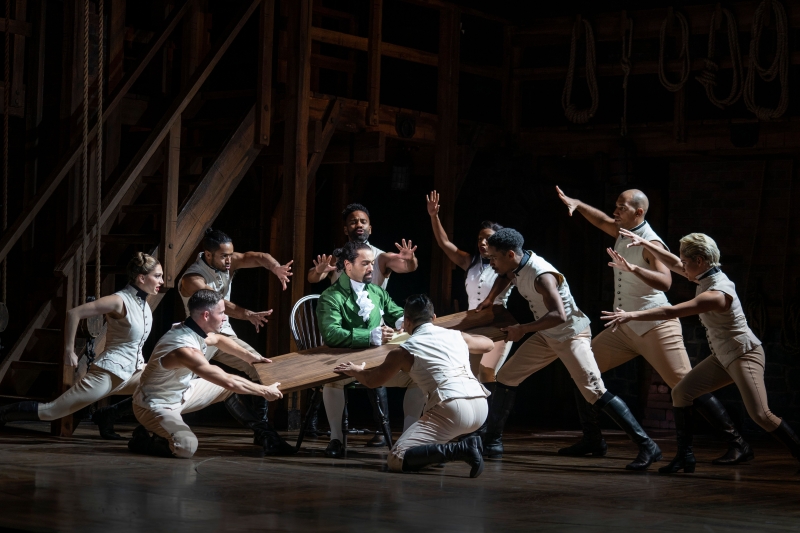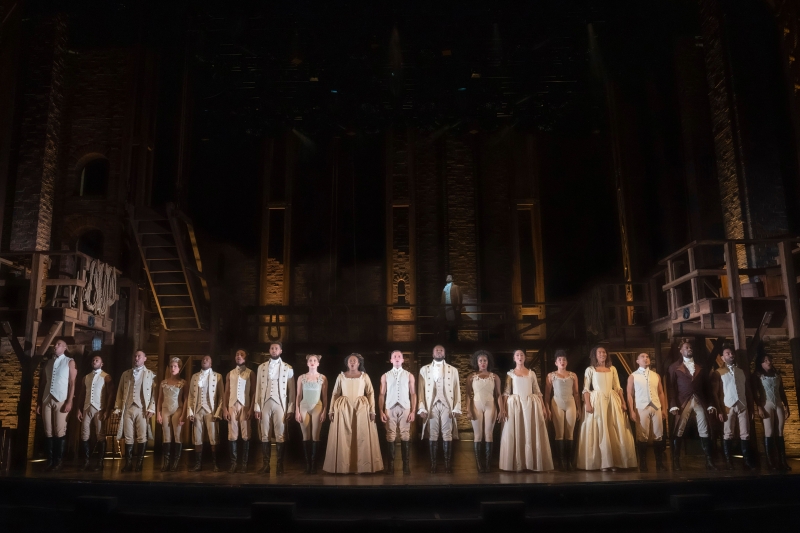Interview: Adam Ali-Perez of HAMILTON at Proctors Theatre
On stage March 14th through 26th.
 BroadwayWorld: Hi Adam! Thank you so much for taking the time to talk with me today. To start off, could you introduce yourself with your role in the show?
BroadwayWorld: Hi Adam! Thank you so much for taking the time to talk with me today. To start off, could you introduce yourself with your role in the show?
Adam: My name is Adam Ali-Perez and I am a Universal Swing for Hamilton.
BWW: What does universal swing mean in the Hamilton productions?
Adam: A universal swing means that you're an off-stage cover, much like a regular swing for a specific company. Being "universal" covers all of the ensemble tracks, but for all of the different companies. For me that would be for Hamilton, so that includes Broadway and all of the tours in North America.
BWW: Wow! How many tracks do you cover?
Adam: I cover seven tracks. I cover all of the male ensemble tracks and I cover Laurens/Phillip as well. I cover all of them in every company. I travel and I learn each company's version of whatever track they need assistance for.
BWW: That must be very demanding, both mentally and physically, to be traveling so much. How do you take care of yourself when you're going back and forth?
Adam: I usually already have an idea of a calendar and itinerary for every tour. So if there is some sort of last minute coverage needed and I'm sent away from my home base, which is New York, I try to make myself as comfortable as possible in whatever environment I'm in. Thankfully, a lot of our supervisors and company management, when we voice our needs, can be very accommodating. But once I'm in a new place, I try to look for a great gym and just set up a routine as quickly as possible. I like to know where to get my food, where to work out and get some physical activity. Those routines are very important for your mental health. At least for me, I try to bring my gaming console wherever I go, and that just helps me, you know, just get out of my head if I need a moment.
BWW: To counteract that, what is something that you do in order to prepare specifically for going on? So, rather than how you unwind, how do you get in the zone?
Adam: To get in the zone, especially if it's a last minute travel situation, I kind of just use that flight time to look over my archives of whatever company I'm visiting and my notes corresponding to the tracks that they need a coverage for. Having those notes ready, and glancing over them to have a good idea of what I'm getting into really benefits me. I also run really well on an adrenaline rush and all of that. That kind of excitement puts me in the zone as you put it.
BWW: I can imagine that it is challenging to cover several tracks at once. You say that you take notes, how does that help you to keep track of everything?
Adam: It's especially demanding as a universal swing because not all the tracks are created equally in each company. For example, one of the male ensembles, let's label him Man 1, may not have the same vocal track as another company. He may be a tenor or in another company, a baritone. They're all slightly different. They don't all share the same features or blocking in certain areas. Sometimes they do, which can be great for us and our brains, and it's just less work. Otherwise, we have to make those adjustments. For me, I started in Chicago with the Philip Company as their swing. When Chicago closed, I transitioned into Universal Swing. I would always refer back to my tracking sheet. If there were any changes in a different company that I visited, I would just note the minor changes of the track's journey, or if they tend to split off and perform blocking of another track that I'm familiar with. I would just say, from this part of the number to another, you're a different male ensemble member. Sometimes it's difficult to really put into words. If I'm Man 1, then I have to perform different actions that another ensemble member from my memory would do. I would say, from this point on you're Man 3, and then at the end of the number, you become Man 1 again. I can just follow that pathway and where it splits off for me. There's a lot of organization, there's a lot of mixing and matching. Yeah, and it's figuring out the best way that it works in your brain! There's only so much you can remember, but the main goal is to maintain the integrity of the show, keep everyone safe, keep yourself safe and stay present.
BWW: Speaking of swinging and staying safe, I saw that you do trapeze. How might that help with your performance, and how did you get into that?
Adam: I started gymnastics when I was in high school. I went to LaGuardia High School for Performing Arts, and they happened to offer gymnastics as an extracurricular, so outside of playing the violin after school, I would train in gymnastics and compete for my school. At the end of my time in high school, I transitioned into circus and flying trapeze. It was an easier transition that didn't involve a lot of impact, and it was more sustainable. I find that especially as a swing, there are chances that I won't be on for a full week or I'll be on for more than half of the week depending on availability in the company at the time. A lack of physical activity... it's hard when you do the show, you feel winded, and my mindset is always to be stronger than the show. That way, there's less concern about getting injured, especially with an adrenaline rush. There can be a lot of tension or stress depending on how long it's been since you performed a track. As a universal swing, going to a completely new company and learning a new track within a day and being put on the day after is grueling. Trapeze, rock climbing and bouldering activities outside of the show keep me centered and disciplined. That type of cross training is just very important because even if you do the show, even for those who do the show like eight times a week and they're on stage, you're just doing this, you're just doing the show. And at the end of the week, it can be really crippling for your body and your mental state. I seek a thrill. Although I have no intention of performing flying trapeze or any of those other aerial disciplines, it fills a void for sure. I do my best to share that passion with my castmates whenever I can, and invite them and try to collaborate with the schools nearby. It gives them great publicity. It brings a great group of people who are enthusiastic and looking to challenge their fear of heights.
BWW: Do you like to do a little bit of teaching as well?
Adam: Yeah, I used to be a flying trapeze instructor as well. So when I got into it, we got paid to train and become staff members. We started working on a regular schedule and I would teach whenever I would come home from college or from a contract that took me away.
BWW: Are there other skills that you like to hone when you're not touring, other than staying active?
Adam: I try to keep up with my piano! I started when I was very young, when I was five. I did that until my senior year of high school, before I went away to college and didn't have access to lessons, and a piano, as conveniently. I'll grab our score, I mean, and do my best to plunk it out. My favorites are openings to certain shows. I really enjoy anime, and my favorite opening to play is called My Hero Academia. I enjoy trying to play that opening music for the first season. It's challenging, it works my brain in a different way and it just allows me to sit down and focus on something that doesn't require my full body, but it's super strenuous. Also, when I'm back at home, one of my best friends and I enjoy baking together and he brings me with him to his kitchen. We just like to work on something new or help each other bake for our respective casts.
BWW: Very cool! One of my final questions for you is what advice would you give to someone who is just beginning their swing journey?
 Adam: My advice would be to never be afraid to lean on your fellow swings who have been in the business longer than you have, or in that discipline. It's important to share with one another how you cope and succeed at being a swing. It's also important to learn how to give yourself grace because there will be mistakes, more than you're used to, especially if you're a perfectionist. It's not your fault! We are put in a position, sometimes an impossible position, to do things under high stress and our brains can only memorize and keep track of so much with that type of pressure, especially as a new swing. But, learn from those who have been in the position longer than you. It's only going to deepen your connection with the show and you're gonna put yourself in a position with enough time to know the show almost better than any of your onstage cast members who do the show eight times a week. And that's a really special thing, even in the midst of learning all of these different tracks. Let yourself make mistakes and live in that experience.
Adam: My advice would be to never be afraid to lean on your fellow swings who have been in the business longer than you have, or in that discipline. It's important to share with one another how you cope and succeed at being a swing. It's also important to learn how to give yourself grace because there will be mistakes, more than you're used to, especially if you're a perfectionist. It's not your fault! We are put in a position, sometimes an impossible position, to do things under high stress and our brains can only memorize and keep track of so much with that type of pressure, especially as a new swing. But, learn from those who have been in the position longer than you. It's only going to deepen your connection with the show and you're gonna put yourself in a position with enough time to know the show almost better than any of your onstage cast members who do the show eight times a week. And that's a really special thing, even in the midst of learning all of these different tracks. Let yourself make mistakes and live in that experience.
BWW: That's really quite beautiful! So Adam, Hamilton is coming to Proctors Theatre in Schenectady, why should everyone come visit the show?
Adam: Come visit Hamilton because we have an amazing cast of wonderful performers who are just ready to share! It is a show like none other. You have a cast full of talented and giving performers who worked very hard. They share history and they share themselves. You will enjoy the music, the acting, the vocals will blow your mind, the orchestra, the set, everything about it is spectacular.
BWW: Everyone that has the opportunity to see it, should! I very much appreciate you taking the time to speak with me today and give me a little insight on what it's like to be a universal swing. Thank you so much, Adam.
Adam: Thank you, my pleasure.
Comments



 Hamilton Black Hoodie
Hamilton Black Hoodie Hamilton Unisex Gold Star Show Tee
Hamilton Unisex Gold Star Show Tee Hamilton Shot Glass
Hamilton Shot Glass Hamilton Magnet
Hamilton Magnet
